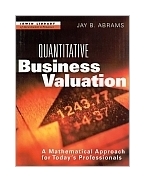|
||
• wydawnictwa polskie
• Zamów informacje o nowościach z wybranego tematu • kontakt
• Cookies na stronie |
QUANTITATIVE BUSINESS VALUATIONABRAMS J.wydawnictwo: MCGRAW-HILL , rok wydania 2001, wydanie Icena netto: Quantitative Business Valuation A Mathematical Approach for Today's Professionals Every once in a while, a researcher appears who is so innovative and whose work is of such a groundbreaking nature that he deserves every bit of notice he receives. Leading valuation and litigation economist Jay B. Abrams is just such a researcher, and his book Quantitative Business Valuation the first all-inclusive guide to quantitative measurement in the valuation of privately held businesses is equally deserving of notice. A rigorous and eye-opening treatment filled with applications for a wide variety of scenarios in the valuation of privately held businesses, Quantitative Business Valuation emphasizes regression analysis of real-world transactions: stock market returns, restricted stock discounts, and fractional interest discounts from net asset value in the secondary limited partnership market. The book is organized in five segments. The first three follow the chronology of a valuation: forecasting cash flows, discounting to present value, and adjusting for control and marketability. In the fourth, Abrams assembles the pieces of the puzzle to present a unique and unified approach to valuation one that can be empirically tested and applied to firms of virtually any size along with a discussion of measuring valuation error. He concludes by covering special topics: valuation of startups, measuring the dilution in value that occurs in sales to Employee Stock Ownership Plans (ESOPs), and analysis of company buyouts of partners and shareholders (which draws upon results from ESOP valuations). The resulting work, solidly grounded in economic theory and including all necessary mathematics, integrates existing science into the valuation profession and develops valuation formulas and models that professional practitioners will find useful on a daily basis. A representative but far from exhaustive listing of other business valuation topics covered would include:
Quantitative Business Valuation is the definitive guide to quantitative measurements in the valuation process. No other book written on business valuation is as well researched, innovative, and bottom-line beneficial to practitioners. It is destined to become a standard business valuation reference for decades to come. ABOUT THE AUTHOR Jay B. Abrams, ASA, CPA, MBA, is one of today's leading valuation and litigation economists. The principal in Abrams Valuation Group, he is credited with numerous inventions including the Abrams Log Size Model for calculating discount rates, the Economic Components Model for calculating the discount for lack of marketability, the Abrams Table of Accounting Transposition Errors, Periodic Perpetuity Factors, Annuity Discount Formulas for cash flows with constant growth and stub year, and formulas for valuing leveraged ESOPs with calculating dilution. In addition, Abrams is a popular finance lecturer and the author of numerous influential journal articles. 489 pages Księgarnia nie działa. Nie odpowiadamy na pytania i nie realizujemy zamówien. Do odwolania !. |


